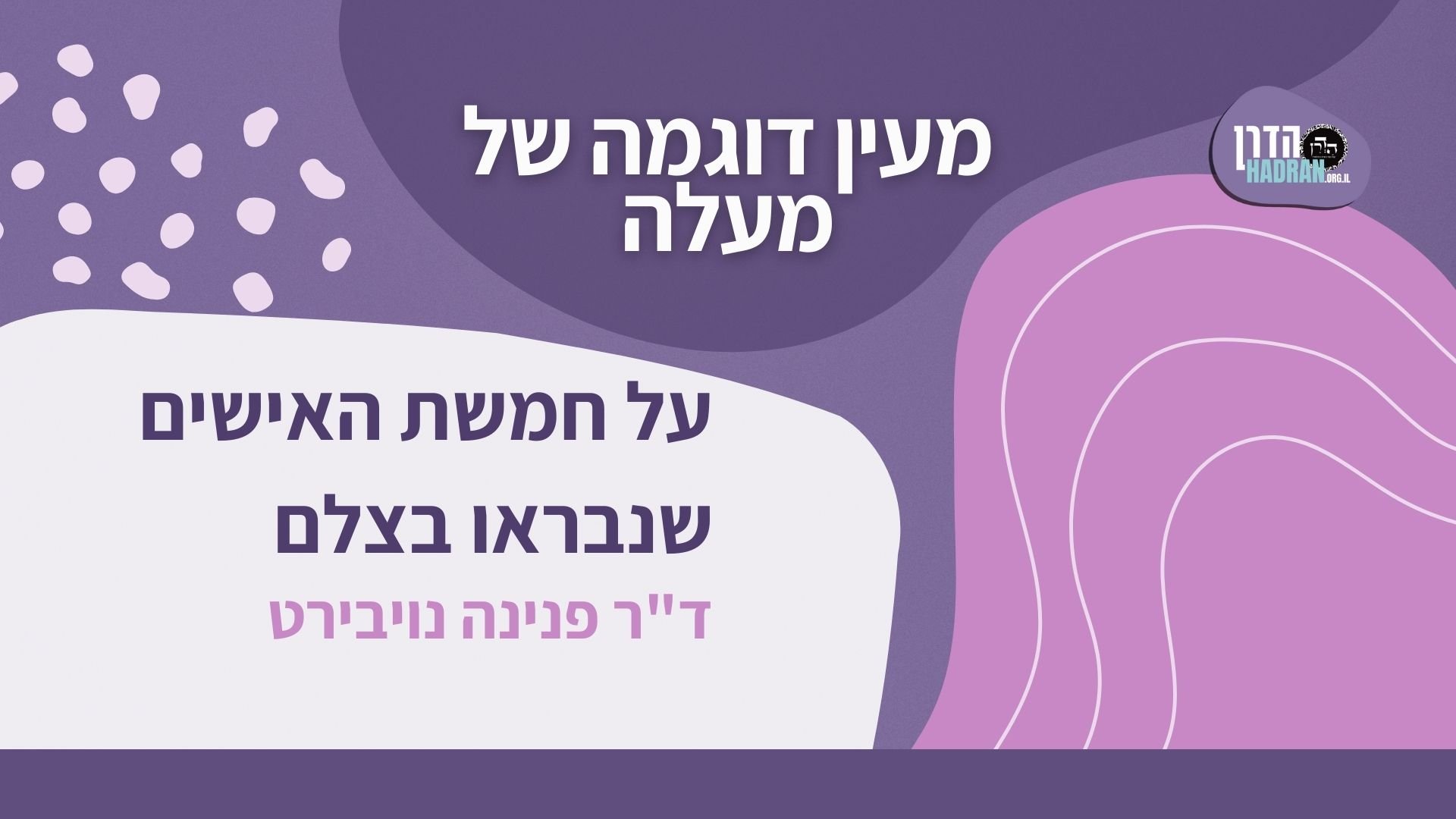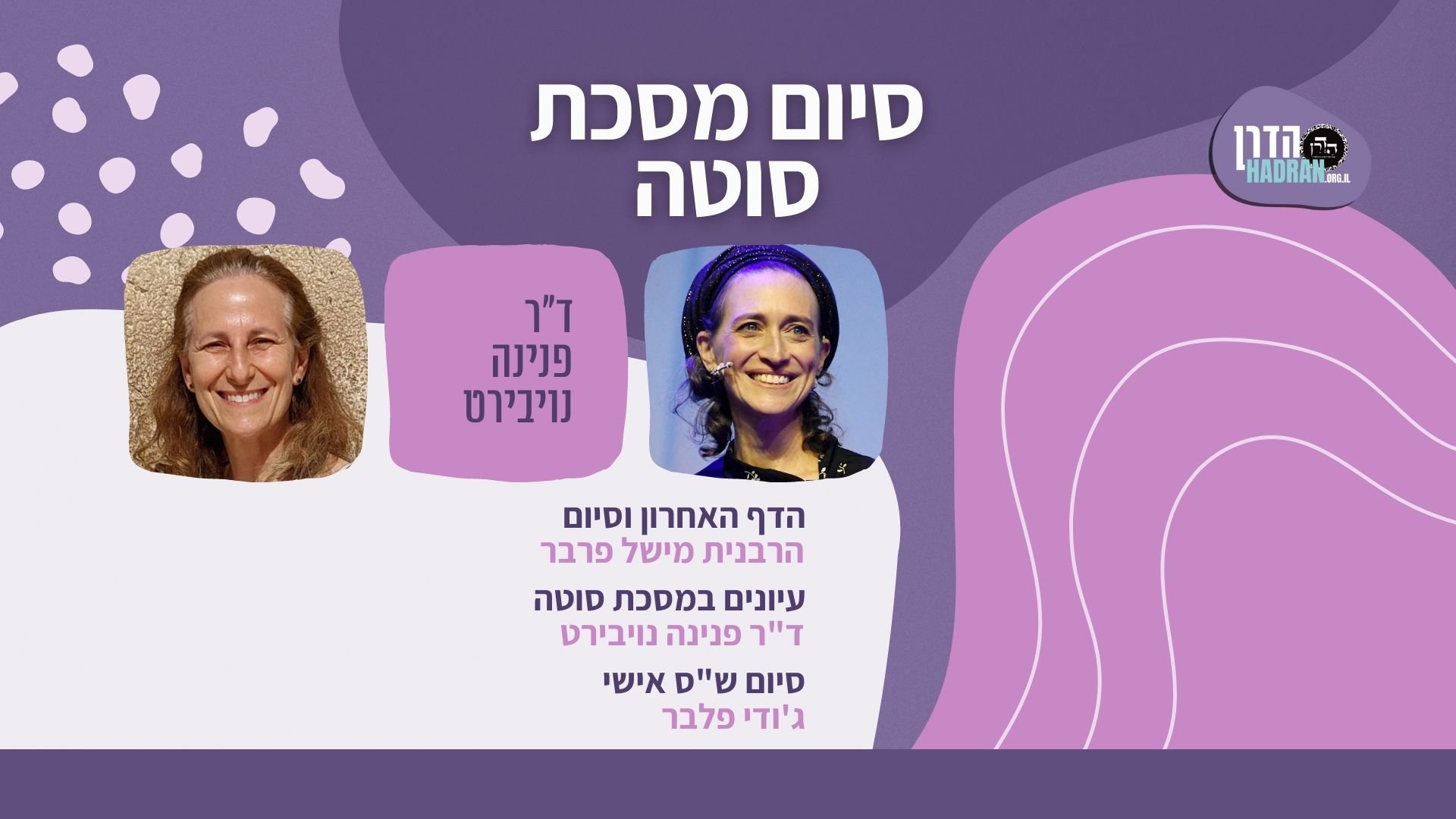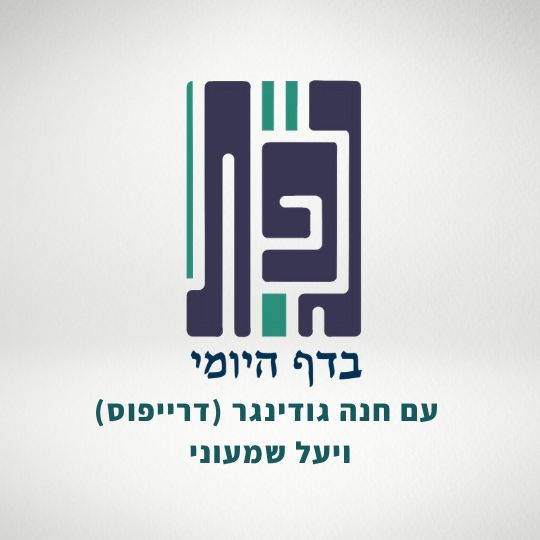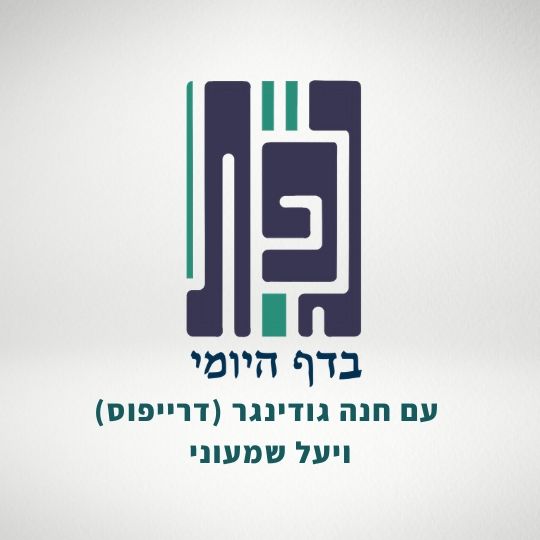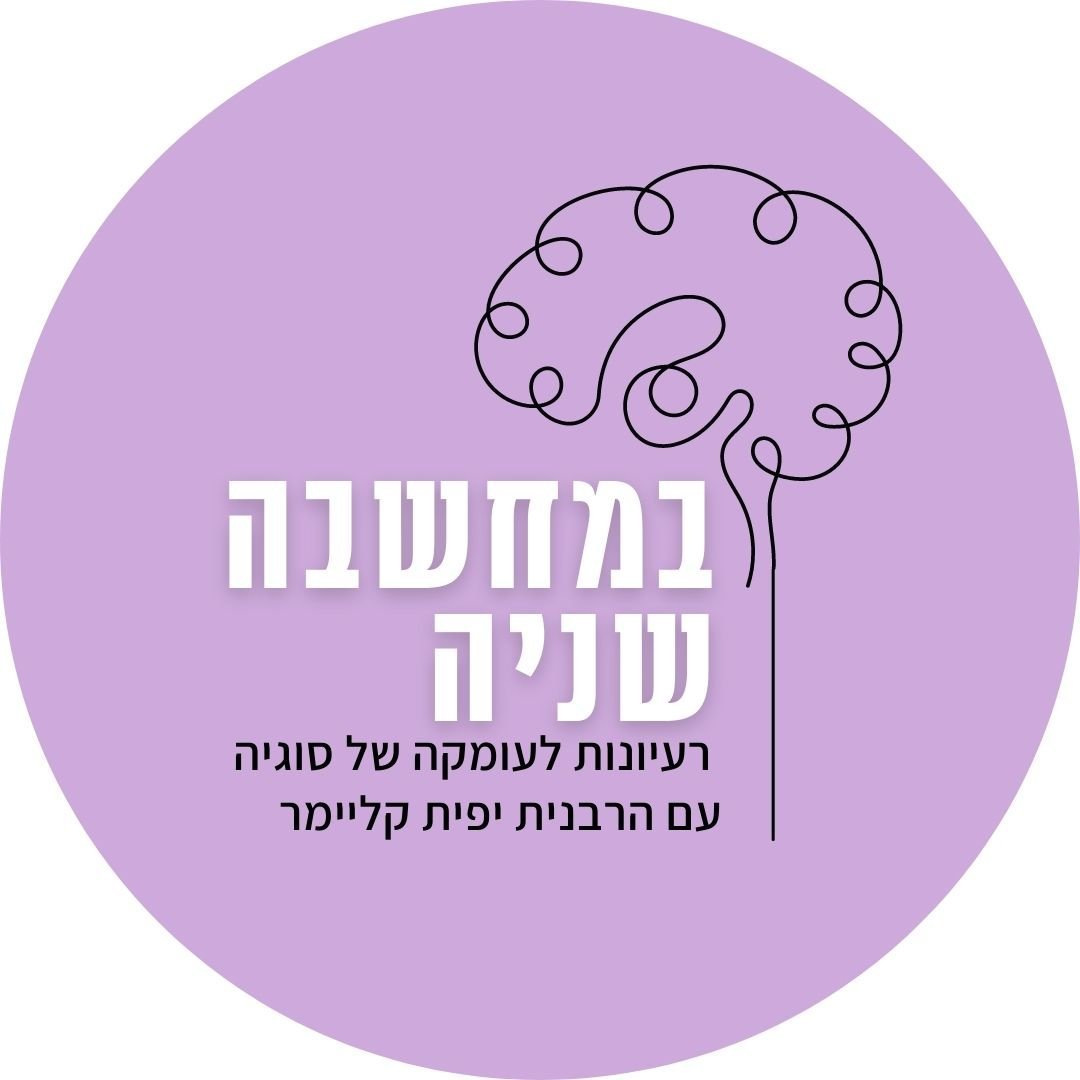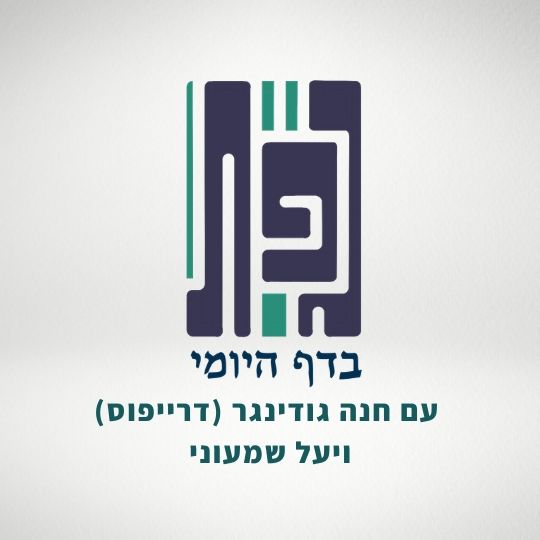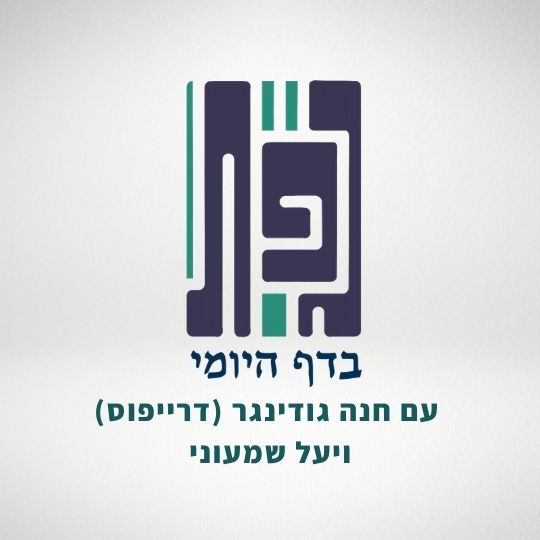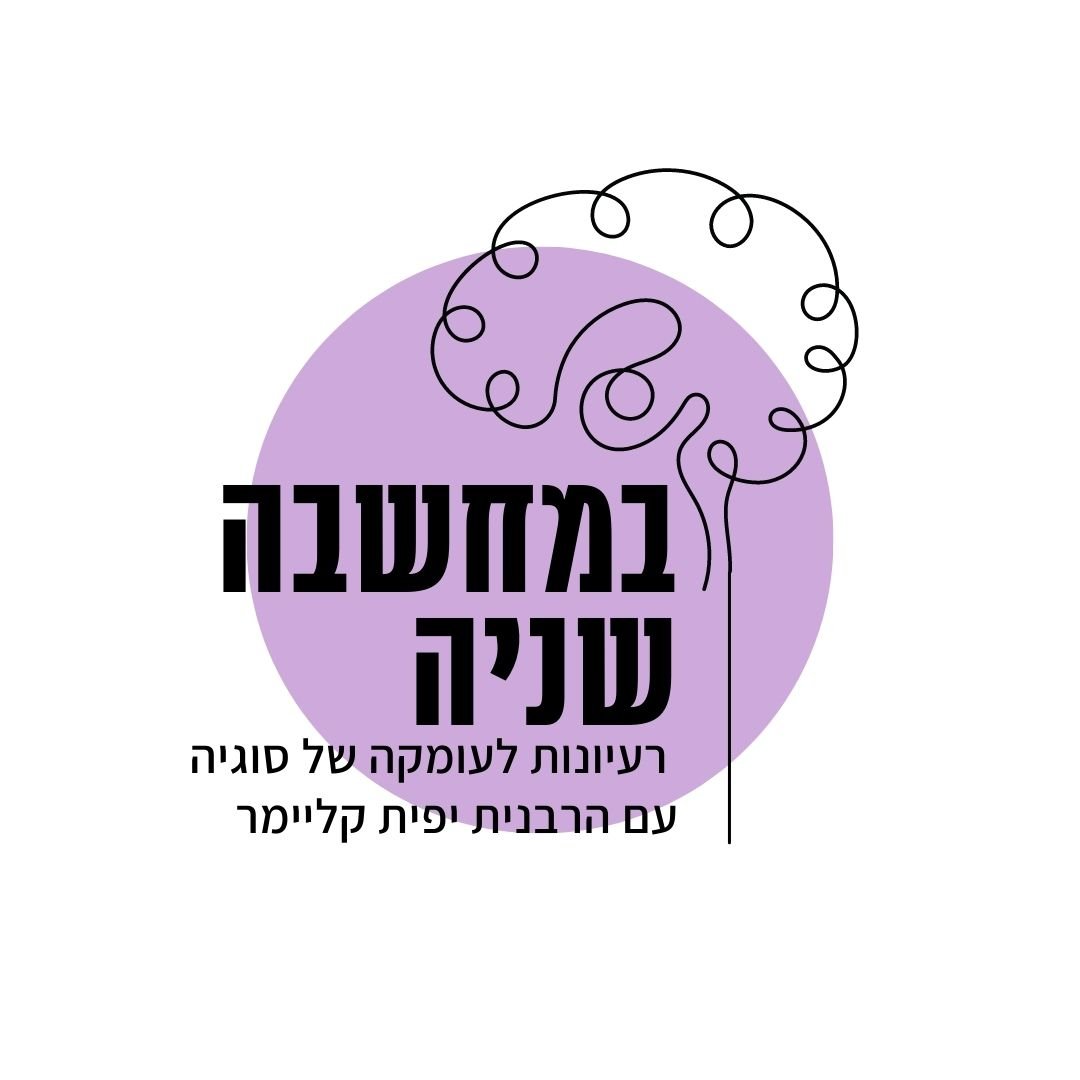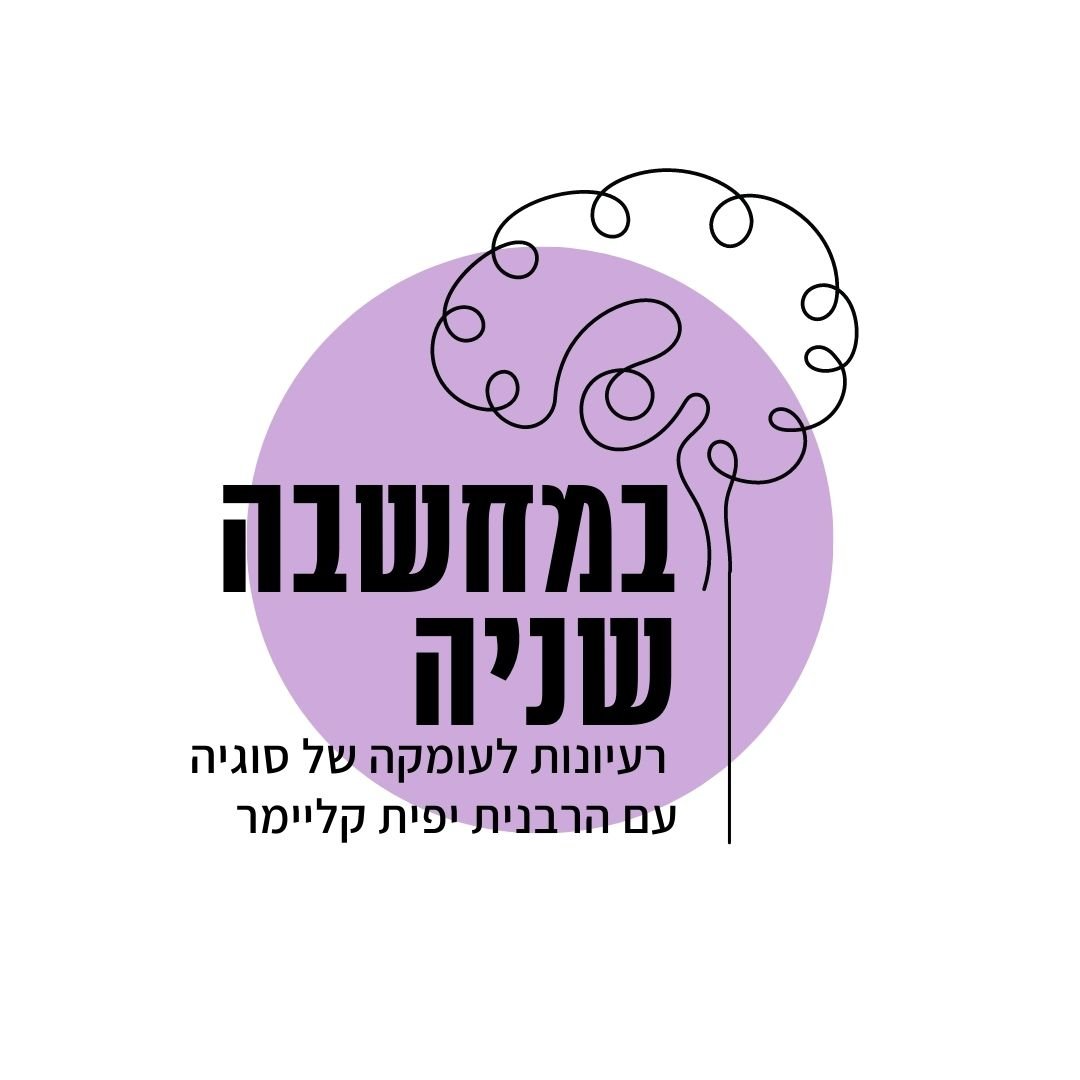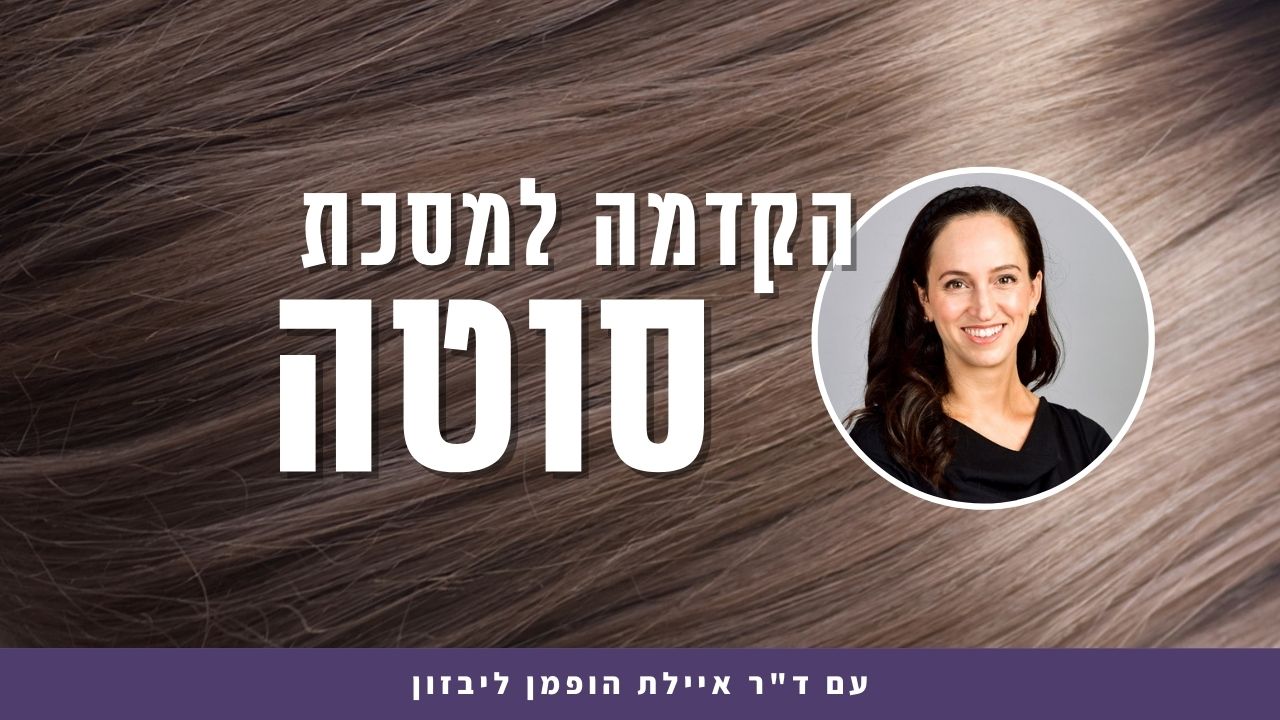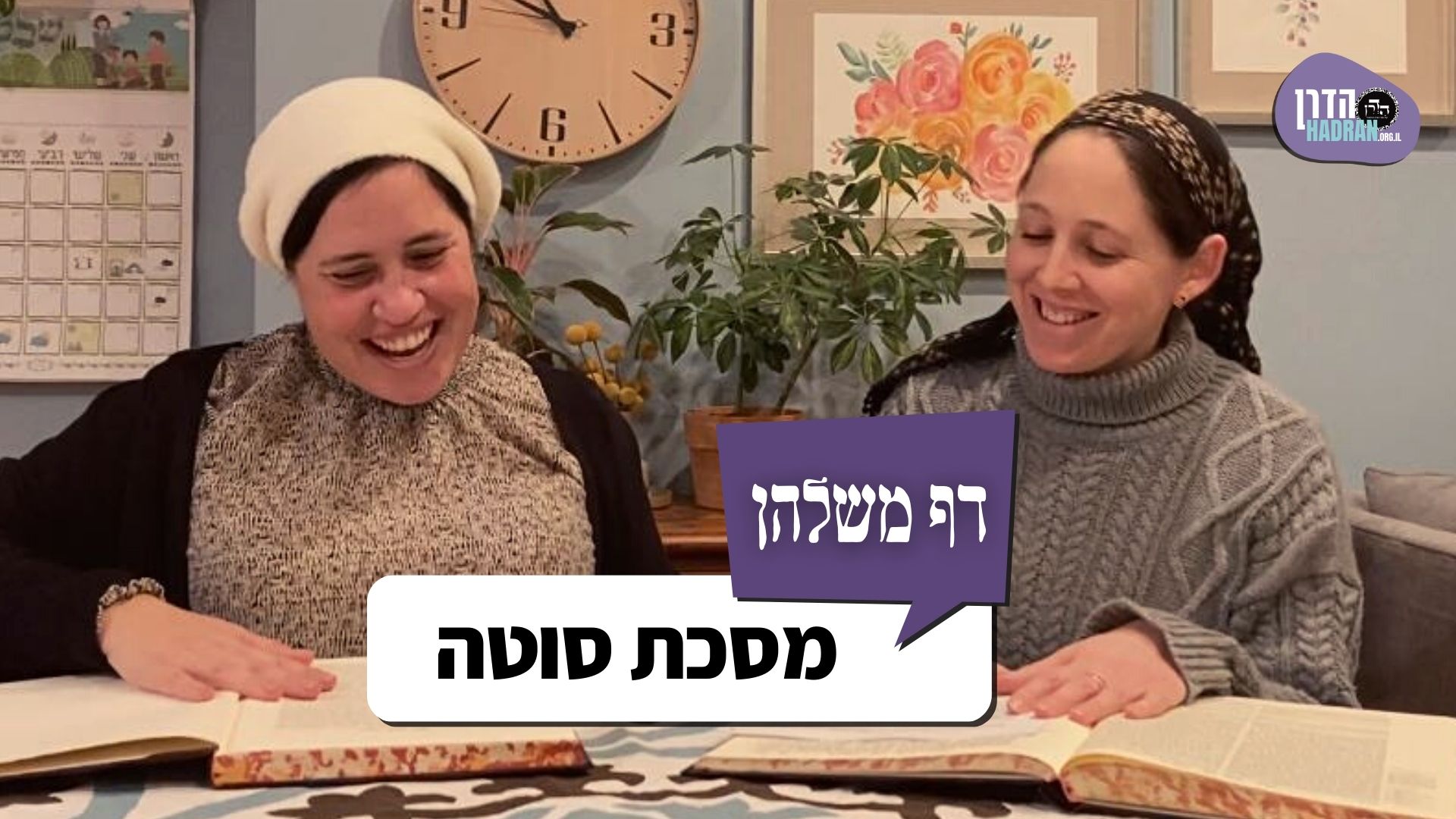סוטה לב
וְהָכָא בְּמַאי עָסְקִינַן — כְּגוֹן דַּאֲתַאי אִשָּׁה מֵעִיקָּרָא.
And with what are we dealing here in the mishna? A case where a woman, who is generally disqualified from bearing witness, came initially, and testified that the woman committed adultery, and two witnesses say that she did not.
וְתָרְצַהּ לִדְרַבִּי נְחֶמְיָה הָכִי, רַבִּי נְחֶמְיָה אוֹמֵר: כׇּל מָקוֹם שֶׁהֶאֱמִינָה תּוֹרָה עֵד אֶחָד — הַלֵּךְ אַחַר רוֹב דֵּיעוֹת, וְעָשׂוּ שְׁתֵּי נָשִׁים בְּאִשָּׁה אַחַת כִּשְׁנֵי אֲנָשִׁים בְּאִישׁ אֶחָד. אֲבָל שְׁתֵּי נָשִׁים בְּאִישׁ אֶחָד — כִּי פַּלְגָא וּפַלְגָא דָּמֵי.
And according to this interpretation you must amend the statement of Rabbi Neḥemya so that it reads like this: Rabbi Neḥemya says: Wherever the Torah relies on one witness, follow the majority of opinions. And the Sages established that two women against one woman are like two men against one man. But two women in opposition to one man that is a valid witness, is like half of a pair of witnesses and a half of a pair of witnesses, and the mishna did not address that case.
וְתַרְתֵּי בִּפְסוּלֵי עֵדוּת לְמָה לִי? מַהוּ דְּתֵימָא: כִּי אָזְלִינַן בָּתַר רוֹב דֵּיעוֹת לְחוּמְרָא, אֲבָל לְקוּלָּא לָא אָזְלִינַן, קָא מַשְׁמַע לַן.
The Gemara poses a question on these two interpretations of the mishna: And why do I need two cases in the mishna to teach the halakha that the majority opinion of those disqualified from bearing witness is followed? The Gemara explains: It is necessary, lest you say that when we follow the majority opinion in the case of invalid witnesses, this is to be stringent to force the woman to drink the bitter water, e.g., if one witness said that she committed adultery and two said that she did not, but to be lenient and absolve her from having to drink the water we do not follow the majority opinion, and she would still drink the water even if there is one witness saying that she did not commit adultery, therefore the mishna teaches us that there is no difference in this regard, and the majority opinion is followed in any case.
הֲדַרַן עֲלָךְ מִי שֶׁקִּינֵּא
אֵלּוּ נֶאֱמָרִין בְּכׇל לָשׁוֹן: פָּרָשַׁת סוֹטָה, וּוִידּוּי מַעֲשֵׂר, קְרִיַּת שְׁמַע, וּתְפִלָּה, וּבִרְכַּת הַמָּזוֹן, וּשְׁבוּעַת הָעֵדוּת, וּשְׁבוּעַת הַפִּיקָּדוֹן.
MISHNA: These are recited in any language, not specifically Hebrew: The portion of the warning and the oath administered by the priest to a woman suspected by her husband of having been unfaithful [sota]; and the declaration of tithes, which occurs after the third and the sixth years of the seven-year Sabbatical cycle, when one declares that he has given his tithes appropriately; Shema; and the Amida prayer; and Grace after Meals; and an oath of testimony, where one takes an oath that he does not have any testimony to provide on a given issue; and an oath on a deposit, where one takes an oath that he does not have possession of another’s deposit.
וְאֵלּוּ נֶאֱמָרִין בִּלְשׁוֹן הַקּוֹדֶשׁ: מִקְרָא בִּיכּוּרִים, וַחֲלִיצָה, בְּרָכוֹת וּקְלָלוֹת, בִּרְכַּת כֹּהֲנִים, וּבִרְכַּת כֹּהֵן גָּדוֹל, וּפָרָשַׁת הַמֶּלֶךְ, וּפָרָשַׁת עֶגְלָה עֲרוּפָה, וּמְשׁוּחַ מִלְחָמָה בְּשָׁעָה שֶׁמְּדַבֵּר אֶל הָעָם.
And these are recited only in the sacred tongue, Hebrew: The recitation of the verses that one recounts when bringing the first fruits to the Temple; and the recitations which form an element of the ritual through which a yavam frees a yevama of her levirate bonds [ḥalitza]; the blessings and curses that were spoken on Mount Gerizim and Mount Ebal; the Priestly Benediction; and the blessing on the Torah recited by the High Priest on Yom Kippur; and the portion of the Torah read by the king at the assembly on Sukkot at the conclusion of the Sabbatical Year; and the portion recited during the ritual of a heifer whose neck is broken, when a person is found killed in an area that is between two cities, and the murderer is unknown; and the speech of a priest who is anointed for war when he addresses the nation before going out to battle.
מִקְרָא בִּיכּוּרִים כֵּיצַד? ״וְעָנִיתָ וְאָמַרְתָּ לִפְנֵי ה׳ אֱלֹהֶיךָ״, וּלְהַלָּן הוּא אוֹמֵר: ״וְעָנוּ הַלְוִיִּם וְאָמְרוּ״. מָה לְהַלָּן בִּלְשׁוֹן הַקּוֹדֶשׁ — אַף כָּאן בִּלְשׁוֹן הַקּוֹדֶשׁ.
How is it derived that the recitation when bringing the first fruits is recited specifically in Hebrew? When the Torah discusses this mitzva it states: “And you shall speak and say before the Lord your God” (Deuteronomy 26:5), and below, in the discussion of the blessings and curses, it states: “And the Levites shall speak and say” (Deuteronomy 27:14). Just as there, the Levites speak in the sacred tongue, so too here, the recitation is in the sacred tongue.
חֲלִיצָה כֵּיצַד? ״וְעָנְתָה וְאָמְרָה״, וּלְהַלָּן הוּא אוֹמֵר: ״וְעָנוּ הַלְוִיִּם וְאָמְרוּ״. מָה לְהַלָּן בִּלְשׁוֹן הַקּוֹדֶשׁ — אַף כָּאן בִּלְשׁוֹן הַקּוֹדֶשׁ.
How is it derived that the recitation at a ḥalitza ceremony must be in Hebrew? The verse in the Torah portion discussing ḥalitza states: “And she shall speak and say” (Deuteronomy 25:9), and below it states: “And the Levites shall speak and say” (Deuteronomy 27:14). Just as there, the Levites speak in the sacred tongue, so too here, the recitation is in the sacred tongue.
רַבִּי יְהוּדָה אוֹמֵר: ״וְעָנְתָה וְאָמְרָה כָּכָה״ — עַד שֶׁתֹּאמַר בַּלָּשׁוֹן הַזֶּה.
Rabbi Yehuda says: This can be derived from a different word in the verse: “And she shall speak and say: So shall it be done to the man that does not build up his brother’s house” (Deuteronomy 25:9). The word “so” indicates that her statement is ineffective unless she says it in these exact words.
בְּרָכוֹת וּקְלָלוֹת כֵּיצַד? כֵּיוָן שֶׁעָבְרוּ יִשְׂרָאֵל אֶת הַיַּרְדֵּן וּבָאוּ אֶל הַר גְּרִיזִים וְאֶל הַר עֵיבָל שֶׁבְּשׁוֹמְרוֹן, שֶׁבְּצַד שְׁכֶם, שֶׁבְּאֵצֶל אֵלוֹנֵי מוֹרֶה. שֶׁנֶּאֱמַר: ״הֲלֹא הֵמָּה בְּעֵבֶר הַיַּרְדֵּן וְגוֹ׳״, וּלְהַלָּן הוּא אוֹמֵר: ״וַיַּעֲבֹר אַבְרָם בָּאָרֶץ עַד מְקוֹם שְׁכֶם עַד אֵלוֹן מוֹרֶה״. מָה אֵלוֹן מוֹרֶה הָאָמוּר לְהַלָּן — שְׁכֶם, אַף אֵלוֹן מוֹרֶה הָאָמוּר כָּאן — שְׁכֶם.
How did the ceremony of the blessings and curses take place? When the Jewish people crossed the Jordan River they came to Mount Gerizim and Mount Ebal, which are in Samaria alongside the city of Shechem, which is near the oaks of Moreh, as it is stated: “Are they not beyond the Jordan, behind the way of the going down of the sun, in the land of the Canaanites that dwell in the Arabah, over against Gilgal, beside the oaks of Moreh?” (Deuteronomy 11:30), and there it states: “And Abram passed through the land until the place of Shechem, until the oaks of Moreh” (Genesis 12:6). Just as the oaks of Moreh mentioned there with regard to Abraham are close to Shechem, so too, the oaks of Moreh mentioned here are close to Shechem.
שִׁשָּׁה שְׁבָטִים עָלוּ לְרֹאשׁ הַר גְּרִיזִים וְשִׁשָּׁה שְׁבָטִים עָלוּ לְרֹאשׁ הַר עֵיבָל, וְהַכֹּהֲנִים וְהַלְוִיִּם וְהָאָרוֹן עוֹמְדִים לְמַטָּה בָּאֶמְצַע. הַכֹּהֲנִים מַקִּיפִין אֶת הָאָרוֹן, וְהַלְוִיִּם אֶת הַכֹּהֲנִים, וְכׇל יִשְׂרָאֵל מִכָּאן וּמִכָּאן, שֶׁנֶּאֱמַר: ״וְכׇל יִשְׂרָאֵל וּזְקֵנָיו וְשֹׁטְרִים וְשֹׁפְטָיו עוֹמְדִים מִזֶּה וּמִזֶּה לָאָרוֹן וְגוֹ׳״.
Six tribes ascended to the top of Mount Gerizim and six tribes ascended to the top of Mount Ebal, and the priests and the Levites and the Ark were standing at the bottom in the middle, between the two mountains. The priests were surrounding the Ark and the Levites were surrounding the priests, and all the rest of the Jewish people were standing on the mountains on this side and on that side, as it is stated: “And all Israel, and their elders and officers, and their judges, stood on this side of the Ark and on that side before the priests the Levites that bore the Ark of the Covenant of the Lord” (Joshua 8:33).
הָפְכוּ פְּנֵיהֶם כְּלַפֵּי הַר גְּרִיזִים וּפָתְחוּ בִּבְרָכָה: ״בָּרוּךְ הָאִישׁ אֲשֶׁר לֹא יַעֲשֶׂה פֶסֶל וּמַסֵּכָה״, וְאֵלּוּ וָאֵלּוּ עוֹנִין ״אָמֵן״. הָפְכוּ פְּנֵיהֶם כְּלַפֵּי הַר עֵיבָל וּפָתְחוּ בִּקְלָלָה: ״אָרוּר הָאִישׁ אֲשֶׁר יַעֲשֶׂה פֶסֶל וּמַסֵּכָה״, וְאֵלּוּ וָאֵלּוּ עוֹנִין ״אָמֵן״, עַד שֶׁגּוֹמְרִין בְּרָכוֹת וּקְלָלוֹת.
The Levites then turned to face Mount Gerizim and opened with the blessing: Blessed be the man who does not make a graven or molten image (see Deuteronomy 27:15), and these people and those people, i.e., the two groups standing on either mountain, answered: Amen. Then they turned to face Mount Ebal and opened with the curse: “Cursed be the man who makes a graven or molten image” (Deuteronomy 27:15), and these people and those people answered: Amen. They continued in this manner until they completed reciting all of the blessings and curses.
וְאַחַר כָּךְ הֵבִיאוּ אֶת הָאֲבָנִים, וּבָנוּ אֶת הַמִּזְבֵּחַ, וְסָדוּהוּ בְּסִיד, וְכָתְבוּ עָלָיו אֶת כׇּל דִּבְרֵי הַתּוֹרָה בְּשִׁבְעִים לָשׁוֹן. שֶׁנֶּאֱמַר: ״בַּאֵר הֵיטֵב״. וְנָטְלוּ אֶת הָאֲבָנִים, וּבָאוּ
And afterward they brought the stones as commanded in the Torah, and they built the altar and plastered it with plaster, and they wrote on it all of the words of the Torah in seventy languages, as it is stated: “And you shall write on the stones all the words of this law clearly elucidated” (Deuteronomy 27:8), indicating that it was to be written in every language. And they then took the stones from there and came
וְלָנוּ בִּמְקוֹמָן.
to Gilgal and slept in their lodging place.
גְּמָ׳ פָּרָשַׁת סוֹטָה מְנָלַן? — דִּכְתִיב: ״וְאָמַר הַכֹּהֵן לָאִשָּׁה״ — בְּכׇל לָשׁוֹן שֶׁהוּא אוֹמֵר.
GEMARA: From where do we derive that the portion of the warning and the oath administered by the priest to a sota can be recited in any language? As it is written: “And the priest shall say to the woman” (Numbers 5:21), which indicates: In any language that he speaks.
תָּנוּ רַבָּנַן: מַשְׁמִיעִין אוֹתָהּ בְּכׇל לָשׁוֹן שֶׁהִיא שׁוֹמַעַת, עַל מָה הִיא שׁוֹתָה, וּבַמָּה הִיא שׁוֹתָה. עַל מָה נִטְמֵאת, וּבַמָּה הִיא נִטְמֵאת.
The Sages taught (Tosefta 2:1): The priest informs the sota in any language that she can hear and understand for what reason she must drink the bitter water of a sota, and from what vessel she will drink, on account of what actions she is considered to be defiled and in what way she defiled herself.
עַל מָה הִיא שׁוֹתָה — עַל עִסְקֵי קִינּוּי וּסְתִירָה, וּבַמָּה הִיא שׁוֹתָה — בִּמְקִידָּה שֶׁל חֶרֶשׂ.
For what reason must she drink the bitter water? She must drink it on account of the matter of the warning given to her by her husband, and her subsequent seclusion. And from what vessel does she drink? She drinks from a mekeida, a simple vessel, of clay.
עַל מָה נִטְמֵאת — עַל עִסְקֵי שְׂחוֹק וְיַלְדוּת. וּבַמָּה הִיא נִטְמֵאת — בְּשׁוֹגֵג אוֹ בְּמֵזִיד, בְּאוֹנֶס [אוֹ] בְּרָצוֹן. וְכׇל כָּךְ לָמָּה — שֶׁלֹּא לְהוֹצִיא לַעַז עַל מַיִם הַמָּרִים.
On account of what actions is she considered to be defiled? It is on account of matters of levity and immaturity. And in what way did she defile herself? The priest must explain to her that there is a difference between whether she acted unwittingly or intentionally, and whether she acted due to circumstances beyond her control, or whether she acted willingly. And why does all of this need to be explained to her? In order not to cast aspersions on the bitter water of a sota, as, if she committed adultery unwittingly or due to circumstances beyond her control, the water will not affect her.
וִידּוּי מַעֲשֵׂר מְנָלַן? דִּכְתִיב: ״וְאָמַרְתָּ לִפְנֵי ה׳ אֱלֹהֶיךָ בִּעַרְתִּי הַקֹּדֶשׁ מִן הַבַּיִת״, וְיָלֵיף אֲמִירָה מִסּוֹטָה — בְּכׇל לָשׁוֹן שֶׁהוּא אוֹמֵר.
From where do we derive that the declaration of tithes may be recited in any language? As it is written: “Then you shall say before the Lord your God: I have put away the hallowed things out of my house” (Deuteronomy 26:13). And derive a verbal analogy from the saying mentioned in this verse, and the saying mentioned in the verse with regard to a sota (Numbers 5:21), that one is permitted to recite the declaration of tithes in any language that he speaks.
אֲמַר לֵיהּ רַב זְבִיד לְאַבָּיֵי, וְלֵילַף אֲמִירָה מִלְּוִיִּם: מָה לְהַלָּן בִּלְשׁוֹן הַקּוֹדֶשׁ — אַף כָּאן בִּלְשׁוֹן הַקּוֹדֶשׁ!
Rav Zevid said to Abaye: But let us derive a verbal analogy from the saying mentioned in the verse: “And the Levites shall speak and say” (Deuteronomy 27:14). Just as there, the Levites recited the blessings and curses in the sacred tongue, so too here, one must recite the declaration of tithes in the sacred tongue.
דָּנִין ״אֲמִירָה״ גְּרֵידְתָּא מֵ״אֲמִירָה״ גְּרֵידְתָּא, וְאֵין דָּנִין ״אֲמִירָה״ גְּרֵידְתָּא, מֵ״עֲנִיָּיה״ וַ״אֲמִירָה״.
Abaye answered: One derives a verbal analogy from the term saying in a verse where the word “say” appears alone and another instance where the word saying appears alone. And one does not derive a verbal analogy from the word saying when it appears alone, as it does in the verse about the declaration of tithes, and in a verse that mentions speaking and saying, such as the verse concerning the Levites.
תַּנְיָא, רַבִּי שִׁמְעוֹן בֶּן יוֹחַי אוֹמֵר: אָדָם אוֹמֵר שִׁבְחוֹ בְּקוֹל נָמוּךְ וּגְנוּתוֹ בְּקוֹל רָם.
The distinction between merely saying, and speaking and saying, is significant, as it is taught in a baraita that Rabbi Shimon ben Yoḥai says: A person should say his own praise in a soft voice, and say that which is to his discredit in a loud voice.
שִׁבְחוֹ בְּקוֹל נָמוּךְ — מִן וִידּוּי הַמַּעֲשֵׂר. גְּנוּתוֹ בְּקוֹל רָם — מִמִּקְרָא בִּיכּוּרִים.
That one should say his praise in a soft voice is derived from the portion of the declaration of tithes, where one declares that he has acted appropriately, and the verse does not state: And you shall speak. That one should say that which is to his discredit in a loud voice is derived from the recitation of the first fruits, concerning which the verse states: “And you shall speak and say” (Deuteronomy 26:5), i.e., it should be recited loudly. The portion recited when bringing the first fruits details the hardships that the Jewish people suffered and denigrates Laban the Aramean, who is a progenitor of the Jewish people.
וּגְנוּתוֹ בְּקוֹל רָם?! וְהָאָמַר רַבִּי יוֹחָנָן מִשּׁוּם רַבִּי שִׁמְעוֹן בֶּן יוֹחַי: מִפְּנֵי מָה תִּקְּנוּ תְּפִלָּה בְּלַחַשׁ, כְּדֵי שֶׁלֹּא לְבַיֵּישׁ אֶת עוֹבְרֵי עֲבֵירָה. שֶׁהֲרֵי לֹא חָלַק הַכָּתוּב מָקוֹם בֵּין חַטָּאת לְעוֹלָה!
The Gemara asks: But should one really say that which is to his discredit in a loud voice? But didn’t Rabbi Yoḥanan say in the name of Rabbi Shimon bar Yoḥai himself: For what reason did the Sages institute that the Amida prayer should be recited in a whisper? So as not to embarrass transgressors who confess their transgressions during their prayer. There is proof that transgressors should not be embarrassed, as the verse detailing where different offerings are slaughtered does not differentiate between the place where a sin-offering is slaughtered and the place where a burnt-offering is slaughtered, so that it will not be recognized when one is bringing a sin-offering and the sinner will not be embarrassed. This shows that one should also say that which is to his discredit quietly.
לָא תֵּימָא גְּנוּתוֹ, אֶלָּא אֵימָא צַעֲרוֹ. כִּדְתַנְיָא: ״וְטָמֵא טָמֵא יִקְרָא״ — צָרִיךְ לְהוֹדִיעַ צַעֲרוֹ לָרַבִּים, וְרַבִּים מְבַקְּשִׁים עָלָיו רַחֲמִים. וְכׇל מִי שֶׁאֵירַע בּוֹ דָּבָר צָרִיךְ לְהוֹדִיעַ לָרַבִּים, וְרַבִּים מְבַקְּשִׁים עָלָיו רַחֲמִים.
The Gemara corrects the previous statement: Do not say that one should say that which is to his discredit in a loud voice; rather, say that one should publicize his pain in a loud voice. As it is taught in a baraita: It is derived from the verse: “And will cry: Impure, impure” (Leviticus 13:45), that a leper must publicize the fact that he is ritually impure. He must announce his pain to the masses, and the masses will pray for mercy on his behalf. And similarly, anyone to whom a painful matter happens must announce it to the masses, and the masses will pray for mercy on his behalf.
גּוּפָא, אָמַר רַבִּי יוֹחָנָן מִשּׁוּם רַבִּי שִׁמְעוֹן בֶּן יוֹחַי: מִפְּנֵי מָה תִּיקְּנוּ תְּפִלָּה בְּלַחַשׁ — שֶׁלֹּא לְבַיֵּישׁ אֶת עוֹבְרֵי עֲבֵירָה. שֶׁהֲרֵי לֹא חָלַק הַכָּתוּב מָקוֹם בֵּין חַטָּאת לְעוֹלָה.
The Gemara returns to the aforementioned matter itself: Rabbi Yoḥanan said in the name of Rabbi Shimon bar Yoḥai: For what reason did the Sages institute that prayer should be said in a whisper? It is so as not to embarrass transgressors, as the verse does not differentiate between the place where a sin-offering is slaughtered and the place where a burnt-offering is slaughtered.
וְלָא? וְהָא אִיכָּא דָּמִים: דַּם חַטָּאת לְמַעְלָה, וְדַם עוֹלָה לְמַטָּה! הָתָם כֹּהֵן הוּא דְּיָדַע.
The Gemara asks: But is there really no differentiation between the places where a burnt-offering and a sin-offering are sacrificed? But isn’t there a difference with regard to the place where the blood is sprinkled, as the blood of a sin-offering is sprinkled above, on the upper half of the altar, and the blood of a burnt-offering is sprinkled below, on its lower half? The Gemara answers: There, the priest is the one who knows what offering it is, but other people who are not standing there do not know.
וְהָאִיכָּא: חַטָּאת נְקֵבָה, עוֹלָה זָכָר! הָתָם מִיכַּסְּיָא בְּאַלְיָה.
The Gemara asks: But isn’t there a visibly apparent difference between the two offerings, as a sin-offering is female and a burnt-offering is male? The Gemara answers: There, in the case of a sin-offering, its genitals are covered by the tail and therefore the gender of the animal is not plainly obvious.
תִּינַח כִּבְשָׂה, שְׂעִירָה מַאי אִיכָּא לְמֵימַר? הָתָם אִיהוּ דְּקָא מַיכְסֵיף נַפְשֵׁיהּ, דְּאִיבְּעִי לֵיהּ לְאֵיתוֹיֵי כִּבְשָׂה וְקָא מַיְיתֵי שְׂעִירָה.
The Gemara asks: That works out well if one brings a female lamb for a sin-offering, as its long tail covers its genitals. However, if one brings a female goat, which does not have a long tail, what can be said? The Gemara answers: If one brings a female goat, there he is the one who embarrasses himself, as he should have brought a female lamb if he wanted to hide the fact that he sinned, and instead he brought a female goat. It is therefore not necessary to be concerned about his embarrassment.
חַטָּאת דַּעֲבוֹדָה זָרָה דְּלָא סַגִּי דְּלָאו שְׂעִירָה, מַאי אִיכָּא לְמֵימַר? הָתָם, נִיכְּסִיף וְנֵיזִיל כִּי הֵיכִי דְּנִכַּפַּר לֵיהּ.
The Gemara asks: With regard to a sin-offering that is brought for idol worship, for which it does not suffice to bring any animal that is not a female goat, as it is explicitly stated that in that case one must bring a female goat as a sin-offering, what can be said? The Gemara answers: There, due to the severity of the sin, let him go and be embarrassed, so that his sin will be atoned for through his embarrassment as well.
קְרִיַּת שְׁמַע מְנָלַן? דִּכְתִיב ״שְׁמַע יִשְׂרָאֵל״, בְּכׇל לָשׁוֹן שֶׁאַתָּה שׁוֹמֵעַ.
§ The Gemara continues its discussion of the recitations that can be stated in any language. From where do we derive that Shema may be recited in any language? As it is written: “Hear, O Israel” (Deuteronomy 6:4), which is homiletically interpreted to mean that it can be recited in any language that you can hear and understand.
תָּנוּ רַבָּנַן: קְרִיַּת שְׁמַע כִּכְתָבָהּ, דִּבְרֵי רַבִּי. וַחֲכָמִים אוֹמְרִים: בְּכׇל לָשׁוֹן.
The Sages taught (Tosefta 7:7): Shema must be recited in Hebrew as it is written; this is the statement of Rabbi Yehuda HaNasi. And the Rabbis say: It may be recited in any language.
מַאי טַעְמָא דְּרַבִּי? אָמַר קְרָא: ״וְהָיוּ״ — בַּהֲווֹיָיתָן יְהוּ.
The Gemara asks: What is the reason for the opinion of Rabbi Yehuda HaNasi? The verse states: “And these words, which I command you this day, will be upon your heart” (Deuteronomy 6:6). “Will be” means as they are, so shall they be. They should remain unchanged, in their original language.
וְרַבָּנַן? אָמַר קְרָא ״שְׁמַע״, בְּכׇל לָשׁוֹן שֶׁאַתָּה שׁוֹמֵעַ.
The Gemara asks further: And what is the reason for the opinion of the Rabbis? The Gemara answers: The verse states: “Hear, O Israel” (Deuteronomy 6:4), which they explain to mean that Shema must be understood. Therefore, one may recite Shema in any language that you can hear and understand.
וְרַבָּנַן נָמֵי, הָא כְּתִיב ״וְהָיוּ״! הַהוּא שֶׁלֹּא יִקְרָאֶנָּה לְמַפְרֵעַ.
The Gemara asks: But according to the Rabbis as well, isn’t it written: “And these words will be”? The Gemara answers: From that it is derived that one may not recite it out of order. One may not begin reciting Shema from the end, but only in the order in which it is written.
וְרַבִּי, שֶׁלֹּא יִקְרָאֶנָּה לְמַפְרֵעַ מְנָלֵיהּ? נָפְקָא לַהּ מִ״דְּבָרִים״ ״הַדְּבָרִים״. וְרַבָּנַן, ״דְּבָרִים״ ״הַדְּבָרִים״ לָא מַשְׁמַע לְהוּ.
The Gemara asks: And from where does Rabbi Yehuda HaNasi derive the halakha that one may not recite it out of order? The Gemara answers: Rabbi Yehuda HaNasi derives it from an additional emphasis in the verse “And the words [hadevarim], which I command you this day, will be upon your heart.” The verse could have conveyed the same idea had it written: Words, without the definite article. However, it says the words, employing the definite article, teaching that it must be recited in the specific order in which it is written. And the Rabbis do not learn anything from the difference between “words” and “the words.”
וְרַבִּי נָמֵי, הָכְתִיב ״שְׁמַע״! הַהוּא מִיבְּעֵי לֵיהּ: לְהַשְׁמִיעַ לְאָזְנֶיךָ מָה שֶׁאַתָּה מוֹצִיא מִפִּיךָ. וְרַבָּנַן סָבְרִי לַהּ כְּמַאן דְּאָמַר: הַקּוֹרֵא אֶת שְׁמַע וְלֹא הִשְׁמִיעַ לְאׇזְנוֹ — יָצָא.
The Gemara asks: But according to Rabbi Yehuda HaNasi as well, isn’t the word “hear” written? The Gemara answers: He requires that for the halakha that you must have your ears hear that which comes out of your mouth, i.e., one must recite Shema audibly so he hears it while reciting it. And from where do the Rabbis derive that one must recite Shema audibly? The Rabbis do not accept this literal interpretation of the word Shema. Rather, they hold according to the one who says: One who recites Shema in a manner inaudible to his own ears has fulfilled his obligation. The Rabbis therefore interpret the word “hear” as referring to the language that one uses.
לֵימָא קָסָבַר רַבִּי
The Gemara asks: Shall we say that Rabbi Yehuda HaNasi holds

